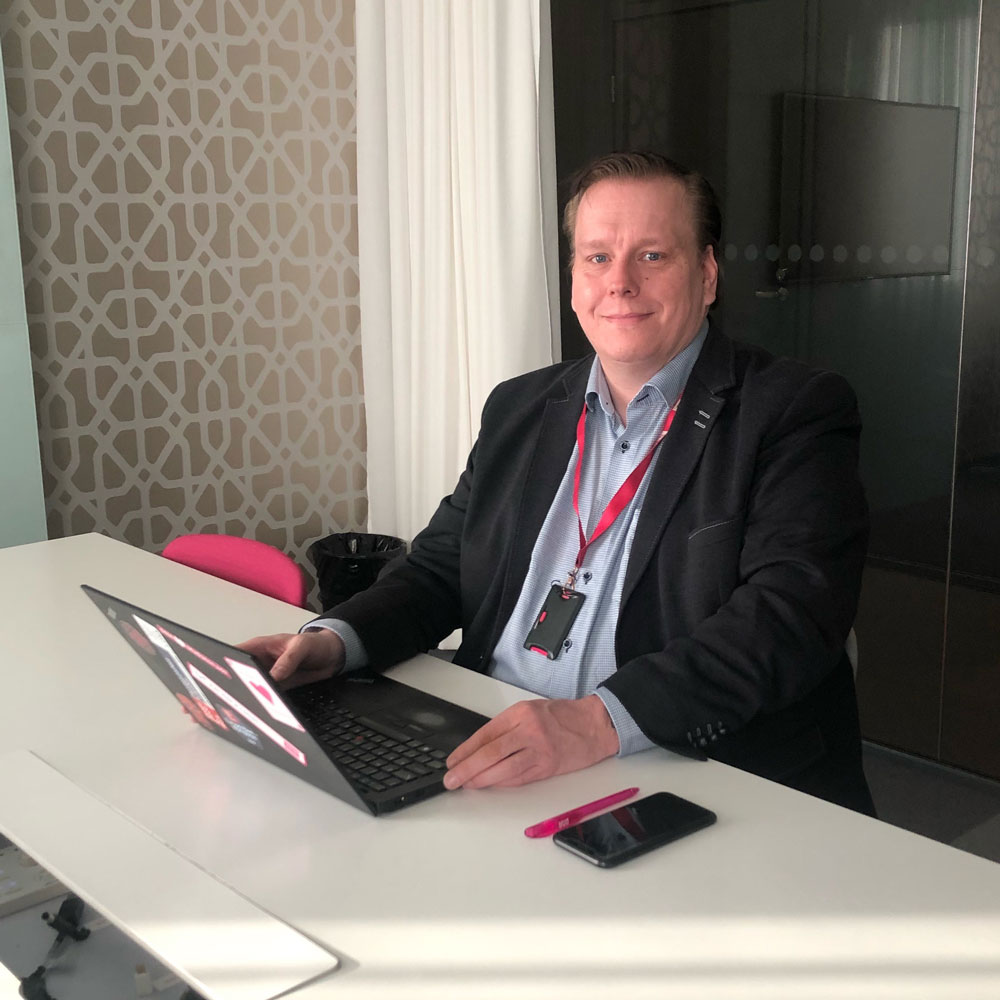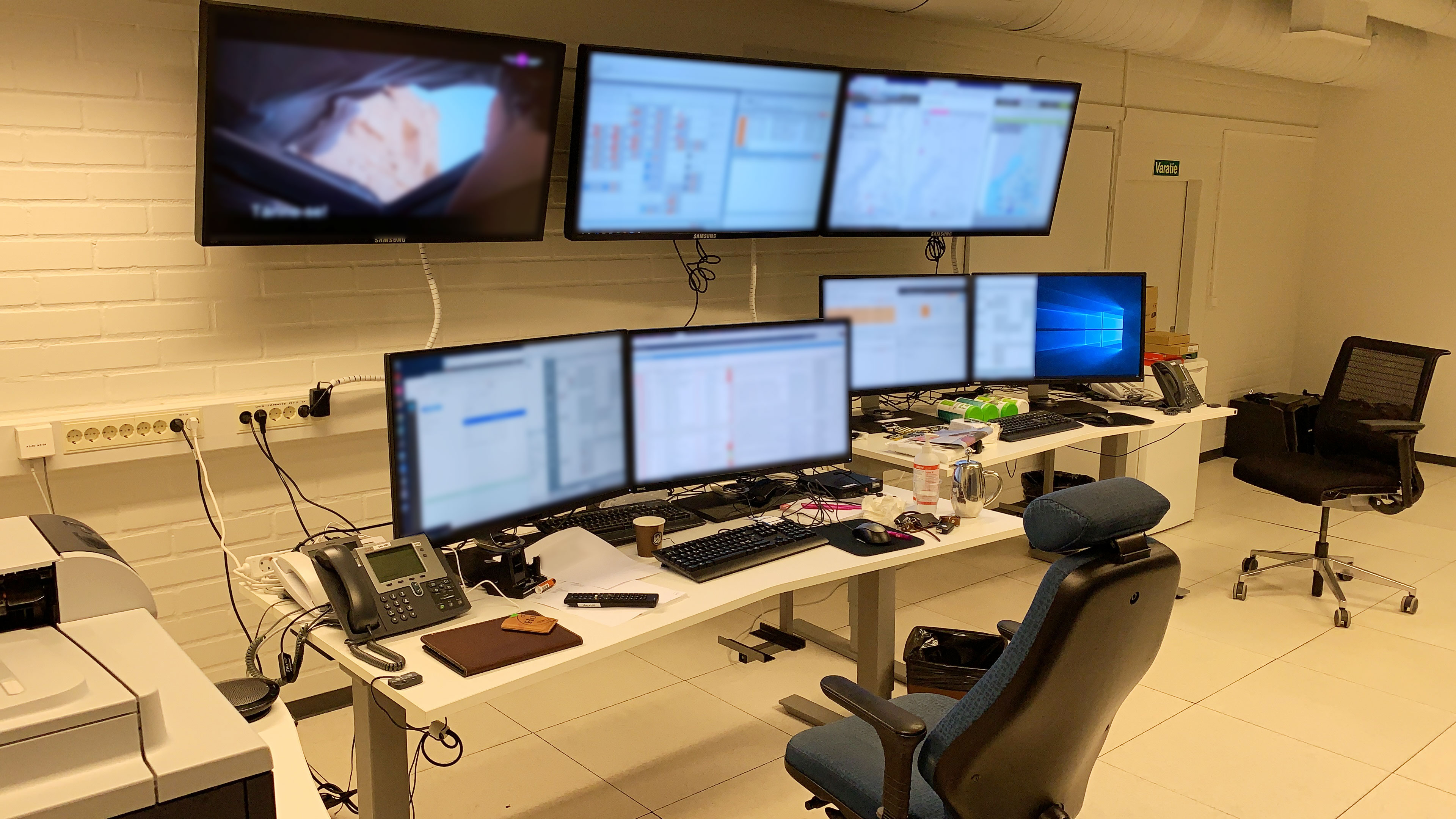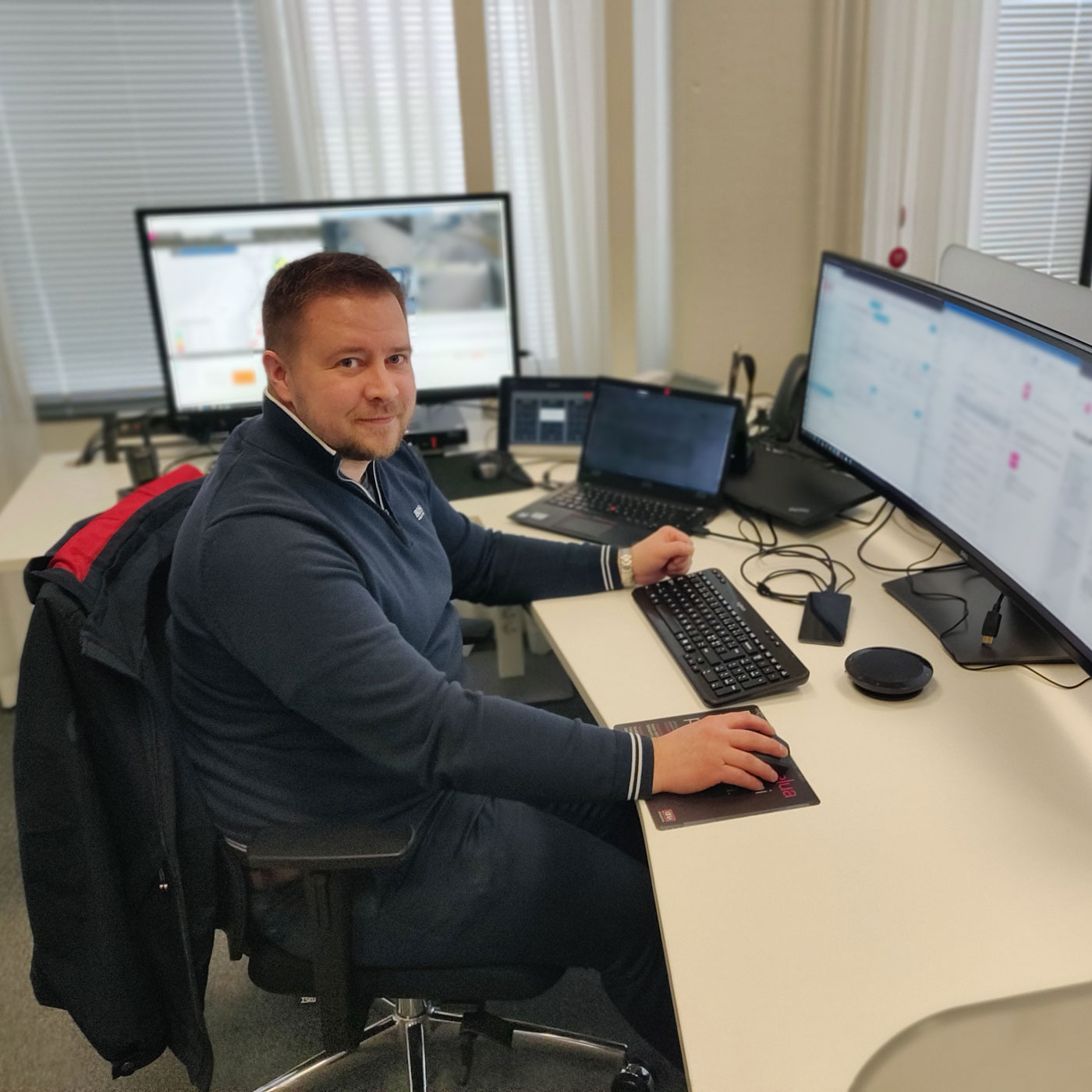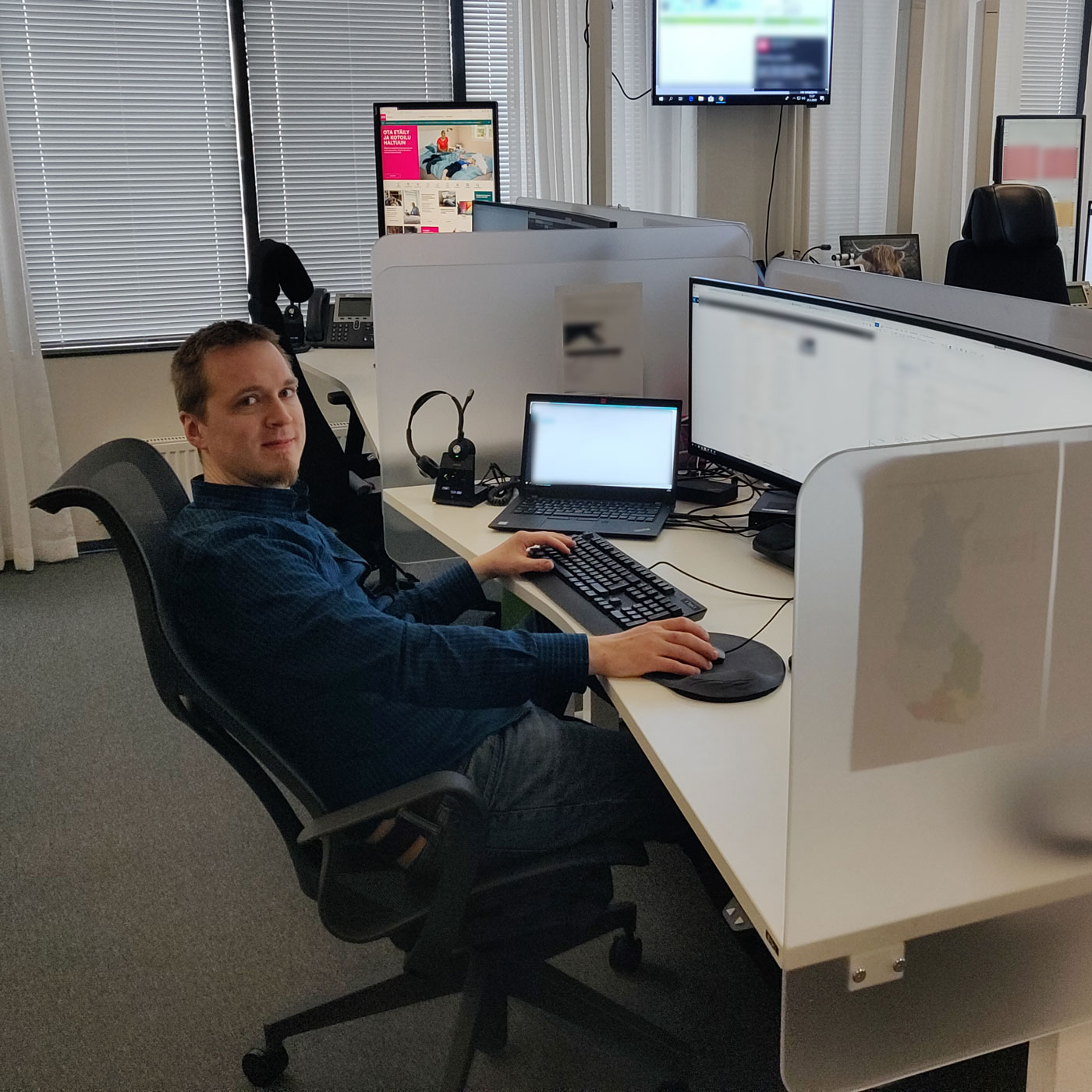“The Management Centre is the heart of DNA’s production. If it coughs, everyone else coughs, too,” says Director Tuomo Rikman with a twinkle in his eye. He leads the Management Centre for the Service Management Unit, which is responsible for monitoring the operational capability of DNA’s networks and services. The importance of this work is highlighted especially now when networks are under exceptional pressure due to the coronavirus situation.
Approximately twenty people work in the Management Centre in two separate teams. One team consists of specialists and the other of Management Centre operators. The operators work in 12-hour shifts around the clock on every day of the year – or 24/7/365, which is the expression used by Group Manager Visa Urpelainen. The operators work in various roles in rotation to maintain competence.
“On weekdays, we take care of critical tasks but also carry out work that is less urgent, such as maintenance authorisations, communication on maintenance and network testing. On weekends and at nights, we focus on monitoring and manage acute incidents and the related communication,” Urpelainen says.
Actions are taken immediately when problems arise and often in a proactive manner. This helps avoid incidents that have external effects. In case such incidents occur and corrective actions are delayed, the control room aims to arrange the service provision in an alternative manner in order to avoid any long-term service disruption to customers. To ensure functioning processes, the key is that the Management Centre, operations, subcontractors and customer service work seamlessly together.
In other words, the employees responsible for all these operations ensure that data is transferred, TV can be viewed and calls made in DNA’s network throughout the country. The stellar professional skills of the team that is welded together stand out in exceptional situations.
“The failure of emergency calls can be a matter of life and death”
 In addition to basic work, the Management Centre is responsible for providing initial information on incidents and maintenance to DNA’s customers, stakeholders and the company’s personnel. Communication takes place through emails, messages, websites and a map service. The Management Centre can also carry out small operations, such as mobile network resets. In more demanding situations, they alert the required technical experts to rectify the incident.
In addition to basic work, the Management Centre is responsible for providing initial information on incidents and maintenance to DNA’s customers, stakeholders and the company’s personnel. Communication takes place through emails, messages, websites and a map service. The Management Centre can also carry out small operations, such as mobile network resets. In more demanding situations, they alert the required technical experts to rectify the incident.
The Management Centre also reports to Traficom, the Finnish Transport and Communications Agency, and cooperates with the emergency response centre and the police, as necessary. In case extensive service disruptions occur, for example, due to a storm, the control room aims to take care of immediate customer communication and of initiating fault repairs.
“If emergency calls fail for some reason, it can be a matter of life and death. Our own actions thus enable the operations of authorities, and there can be a lot at stake,” Rikman says.

The Management Centre was decentralised due to coronavirus – “buddy near you” laptops taken into use
The coronavirus situation is now visible in the daily operations of the Management Centre, as the control room was split into three in March in order to maintain reliable operations. The original Management Centre was divided into two separate physical addresses to ensure that their staff members do not meet each other. This reduces the risk of the spread of infection. The third group started working remotely.
 It took only four working days to carry out the physical split, as the temporary facilities were already there. Rikman thanks the entire Management Centre team, DNA’s facility management and IM profusely, as they enabled the quick split into two addresses. For the control room with around-the-clock operations, the shift timetables of employees and the infrastructure enabling long-term working, such as chairs, tables, refrigerators and microwave ovens, are some examples of the challenges they faced. The temporary facilities already had almost all the required equipment.
It took only four working days to carry out the physical split, as the temporary facilities were already there. Rikman thanks the entire Management Centre team, DNA’s facility management and IM profusely, as they enabled the quick split into two addresses. For the control room with around-the-clock operations, the shift timetables of employees and the infrastructure enabling long-term working, such as chairs, tables, refrigerators and microwave ovens, are some examples of the challenges they faced. The temporary facilities already had almost all the required equipment.
“We have been practicing for exceptional situations already for years. Our processes are in good shape and the priority of various critical tasks is clear. We built the temporary facilities already years ago,” Urpelainen says.
Both control rooms are now staffed around the clock. To ensure that the operators who previously worked in pairs are not alone at nights and during weekend shifts, the control rooms are using separate “buddy near you” laptops for transmitting image and voice from the other control room. With this, you can easily talk to a colleague who is physically in another location as if they were sitting next to you. In addition, all employees are now using their personal keyboards and mice.
“Everything in the new Management Centre is otherwise fine, but we forgot to take our cocoa when we moved,” Rikman says and laughs. Urpelainen immediately says that cocoa is already on the way.
“I didn’t have to hesitate at all when asked to be flexible”
 The exceptional situation also requires flexibility from the employees. However, operator Tomi Suokas ensures that the strong team spirit in the Management Centre and the mutual trust enabled the exceptional measures to be taken quite smoothly.
The exceptional situation also requires flexibility from the employees. However, operator Tomi Suokas ensures that the strong team spirit in the Management Centre and the mutual trust enabled the exceptional measures to be taken quite smoothly.
“I didn’t have to hesitate at all when they asked us to be flexible regarding our work shifts due to the exceptional measures caused by coronavirus. Everyone understood immediately what it means, as many have worked here for a long time. This is the best job I’ve ever had,” Suokas says.
He started at DNA’s customer service already in 2011 and transferred later to technical support tackling more technical problems. Eighteen months ago he decided to apply for the position of Management Centre operator. It was a good decision.
“Many others have also transferred from technical support to the Management Centre, and I had heard a lot of positive things from them. I’m still learning new things every day and there are no dull days.”
Urpelainen smiles at Suokas’ comments, as the Management Centre has indeed attracted many people working in DNA’s technical support. This is because sufficient experience from technical support enables learning the work and key duties of a Management Centre operator in approximately 3–4 months. Work at the Management Centre requires extremely diverse competence, “everything on more or less everything”.
“I would like to use this opportunity to send my thanks and apologies to DNA’s technical support for the internal hijacking that we’ve done, “ Urpelainen states.
Secured operations
Everyone in the Management Centre have understood the seriousness of the coronavirus situation. These are exceptional times, and flexibility is necessary. Tuomo Rikman ensures that when the most difficult times are over and the situation returns to normal, the flexibility of employees will be acknowledged. However, despite the exceptional situation, flexibility is still mutual to make sure that employees can also organise their personal life in this situation.
What would the Management Centre team like to say to customers who are concerned about the robustness of networks? After all, data and call volumes in DNA’s networks have increased by several dozens of percentages due to remote work and studies and leisure time spent at home.
“Network and service operations have been secured. We are prepared and have been practicing for exceptional situations. We have considered competence, personnel resources, spare parts and capacity. Our network bandwidth is sufficient and you can use services without worries.”










